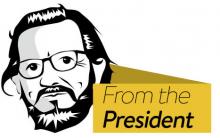Issue:

WHILE THIS IS MY first column for the Number 1 Shimbun since becoming president of the FCCJ on June 15, I would like to pick up where my predecessor Suvendrini Kakuchi left off in her last column. Continuity of purpose in a number of issues facing the Club is important.
But before going into some of the topics in her last column, I think it’s perhaps necessary to ask more fundamental questions about the Foreign Correspondents’ Club of Japan: What is its purpose and what is its future?
The FCCJ is more than 70 years old. If it were human, it would be drawing a pension and looking forward to visits from grandchildren. If not quite playing gateball, it would lack the energy of 30 years ago and the spring in the step would pretty much have sprung.
The General Manager tells me the average age of the membership is now 62 years, so generally speaking we Members aren’t exactly a collection of spring chickens, either.
Yet, at the heart of the FCCJ is something vital, powerful, essential to democracy, essential to freedom and something we must guard and defend to ensure it outlives us all. That, of course, is Freedom of the Press in the service of the public’s right to know.
Reporters Without Borders releases a ranking of freedom of the press in scores of countries around the world. The higher a country’s position in the index, the greater the measure of press freedoms. Japan’s ranking in the World Press Freedom Index was 59 in 2014. It slipped slightly to 61 in 2015 and then took a much larger slump this year to 72. That slotted Japan between Tanzania and Lesotho on the index, which covers 180 countries.
Why is Japan falling down the table in this key measure of democracy? Well, you can read for yourself on their website https://rsf.org/en/ranking/2016.
I would argue the FCCJ plays a particularly precious role in preserving press freedoms in Japan and it has nothing to do with the word “Foreign.” The FCCJ is not owned by any press baron or media conglomerate that takes a particular tilt or editorial view of news events. The FCCJ is independent and its press events are open to all. It should remain this way.
At its heart and soul, the purpose of the FCCJ is to preserve and defend this space for the public’s right to know. The Club may not always be bustling with packed press conferences, but that space is always there for when it’s needed.
Historical examples show hardwon democratic freedoms don’t typically disappear overnight, they are lost to slow erosion. Is that what the Reporters Without Borders index shows regarding press freedoms in Japan? Slow erosion?
The question remains, but it helps us answer the second question I asked at the start of this column. The FCCJ’s future is here and now and ever more important. The FCCJ may not have the snazziest, jazziest facilities of Tokyo clubs (at least not yet) but it is unique.
I’ve run out of space here to follow up on some of my predecessor’s important points. We can save that for future columns. So let me finish by wishing everyone funfilled, yet relaxing summer holidays.
– Peter Langan

